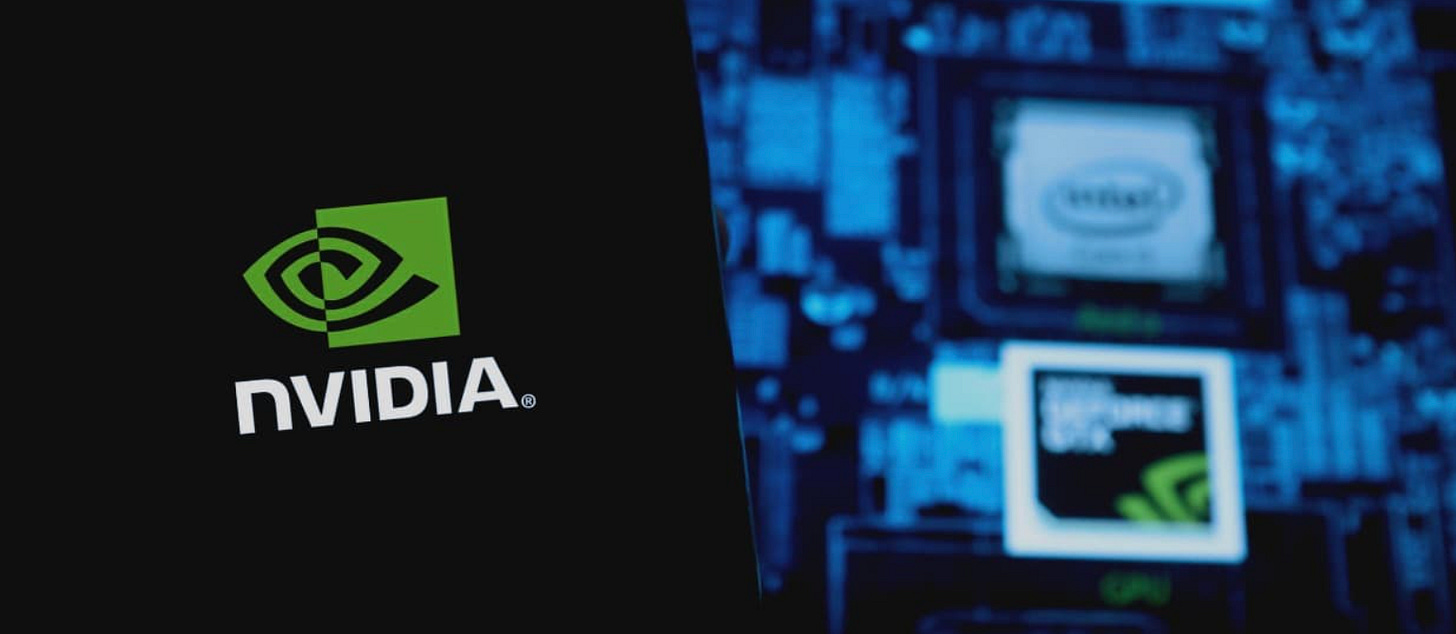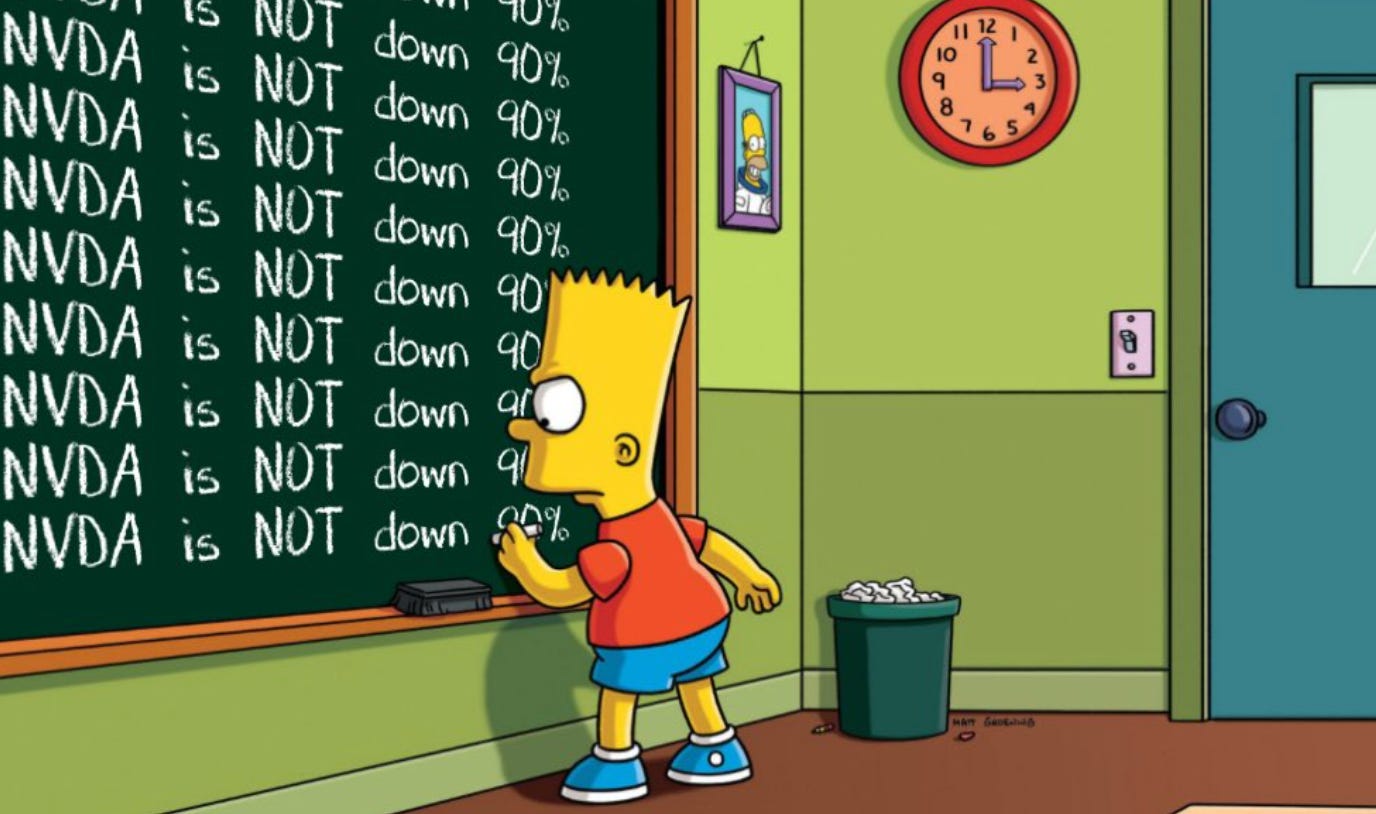Why is Nvidia stock DOWN 90%???
Did the AI bubble burst? Read and find out!
But, before you go for the article, make sure you help spread this newsletter to your friends and family!
The stock market can be very volatile, but 90% down in 1 day? Wow…
1- What has been Nvidia's performance?
Nvidia as a company and stock has been on a tear for the past 18 months:
Revenue is up from $6B in Q4 2022 to $26B in Q1 2024 (staggering growth of 433%!);
Net income (profit) is up more than 10x (1,000%)!!!
At the same time, the stock is up 730%
2- What was the drop?
Yes, dozens of readers, Nvidia is down 90% from its ALL-TIME-HIGH reached last Friday, 7th of June.
At last Friday's close, the stock had reached $1,208 per share. On Monday, at market opening, it was trading at $120 a share.
3- Did the BUBBLE BURST?
Well, not really. Nvidia did not lose any value at all; what happened was what we call a stock split. Our most financially fanatic readers will know what that is… but, if you don't, let me break it down:
Every investor that had 1 Nvidia stock on Friday at close, was “gifted" another 9 shares over the weekend and, on Monday morning, he saw 10 times more Nvidia shares in his portfolio.
4- What is a Stock Split?
Before we go into the definition of “stock split", let us understand what a company's market cap is:
MARKET CAP (or market capitalization) is the value of a publicly listed business, calculated by multiplying its share price by the amount of shares outstanding.
EXAMPLE:
Let's say company A has 1 million shares available to be openly traded in the market and each share is valued at $50. So, it's market cap is $50 x 1,000,000 = $50,000,000. So, the company's market cap is $50M. (Obs.: it's a simplified explanation without considering the intricacies of cash, debt, or goodwill in the balance sheet).
Now, let's say the same company A is going through a 5 to 1 stock split - for every share, another 4 will be “gifted” to the shareholders. BUT, as the company value should remain unchanged (remember, a stock split in itself does not create real value!), as you have 5 times more shares, the value of each share should be:
Share value = Market Cap / number of shares outstanding
New share value = $50M / (5 x 1,000,000) = $10
So, is the stock down 80% (from $50 to $10)? NOOOO! A stock split has happened.
5- So, why do a stock split?
In theory, there would be no reason for a stock split, especially now, when many brokerage firms offer trading in fractional shares (you don't need to buy 1 whole share - many offer the functionality to buy 0.1 share, for example).
That's why so many people say it should be considered a NON-EVENT by serious investors. It is like having a waiter ask you how many slices you would like your pizza to be cut in and you say: “please slice it in 4 because I couldn't possibly eat 6 or 8!"
The pizza size (Market Cap) is still the same, despite the number of slices (shares outstanding).
But, there are a few reasons why a Company chooses to go for a stock split:
a lower share price can influence some retail investors (subconsciously) to buy the stock. Apparently, many people feel more comfortable buying a $100 stock than a $1,000 stock;
a lower share price can help the company democratize stock-based compensation for more employees - there is a higher probability that lower-paid employees can get stock options if the price is lower and more compatible with their salaries; (For me this is the real valid reason for a stock split nowadays)
some companies try to enhance their stocks liquidity but increasing the number of shares being traded - a cheaper price also helps in that sense;
some indices, like the Dow, are stock-price weighed, not market cap weighed (like the S&P500, or FTSE 100) - so, a cheaper stock price makes an inclusion in the index more likely. (But, no one really cares about the Dow anyways, so…)
5- Disclaimer
This is the boring part where I tell you this newsletter is not investment advice, it is just informative and expresses the views of the author on the matters discussed.
Talk to a professional (me!) before you decide on the best course of action and financial plan for your future.
And, don't for get to…






